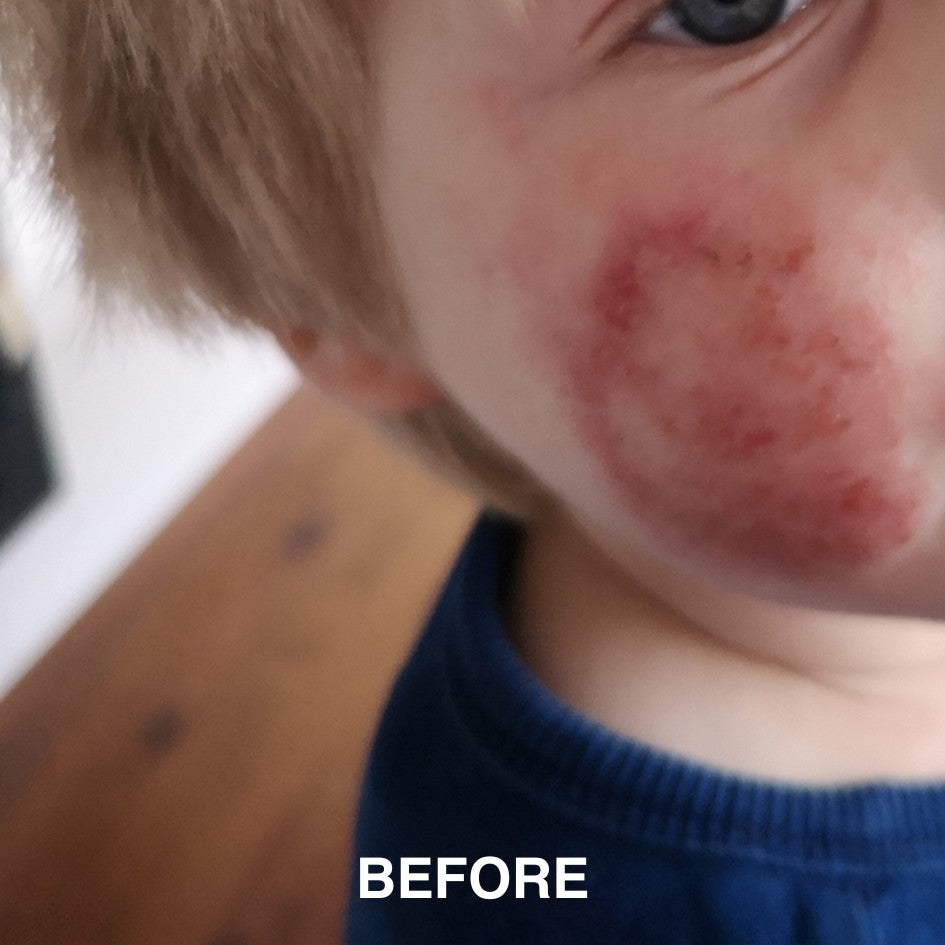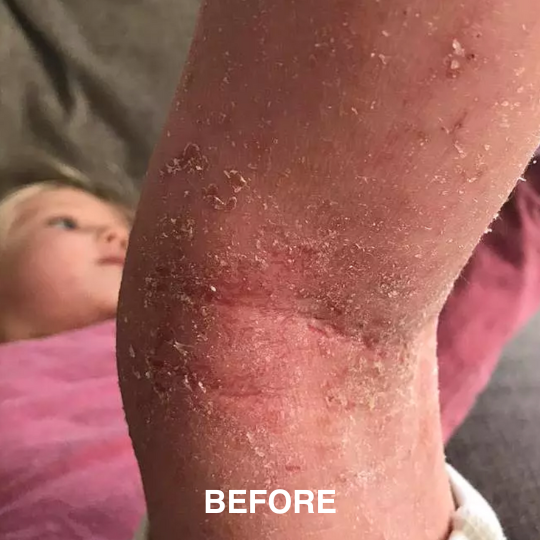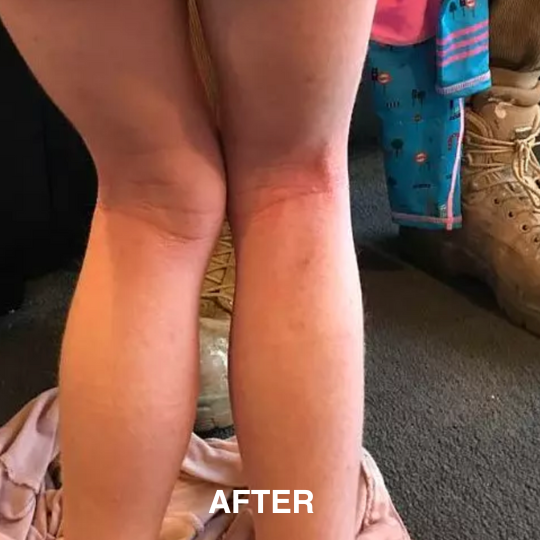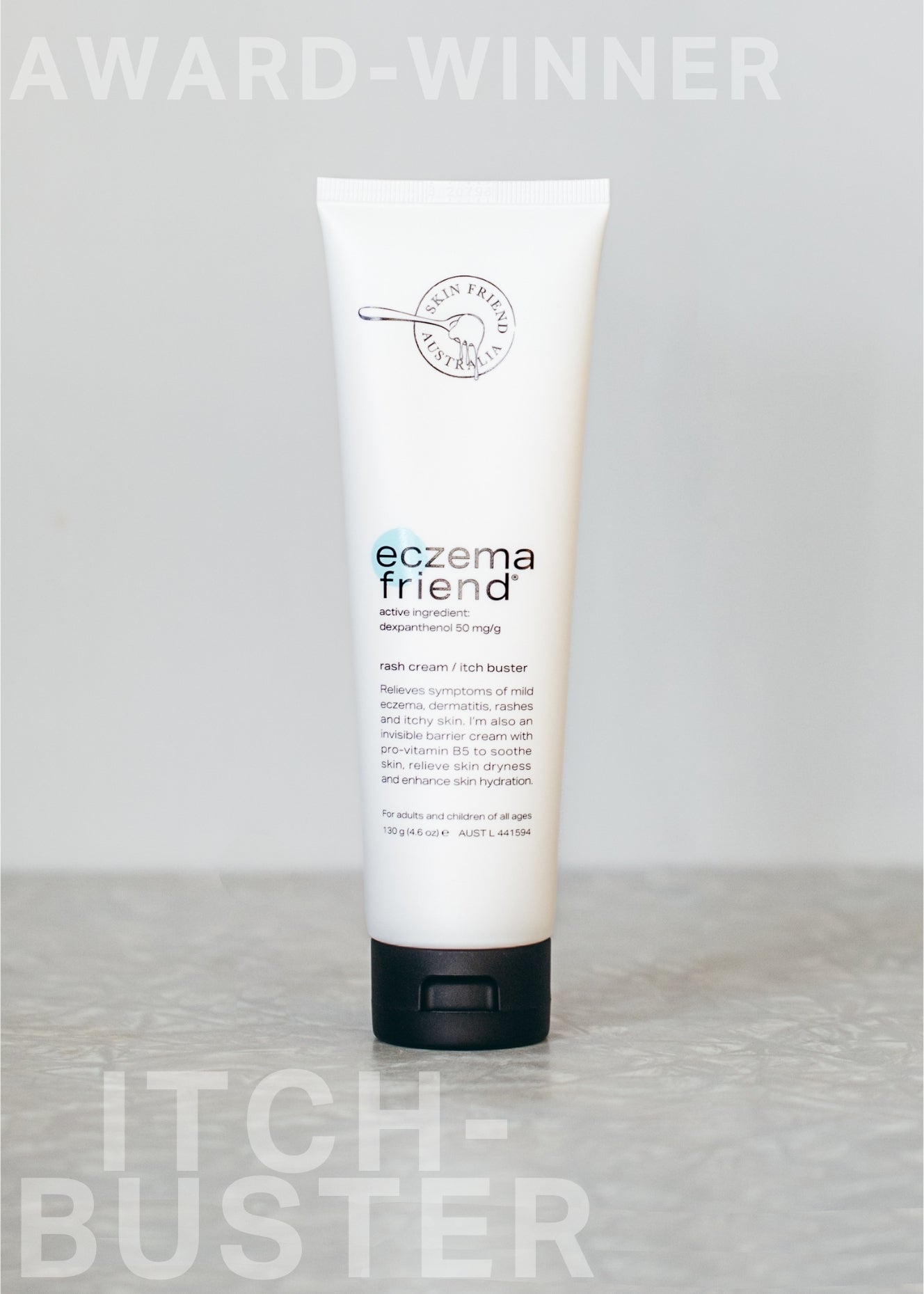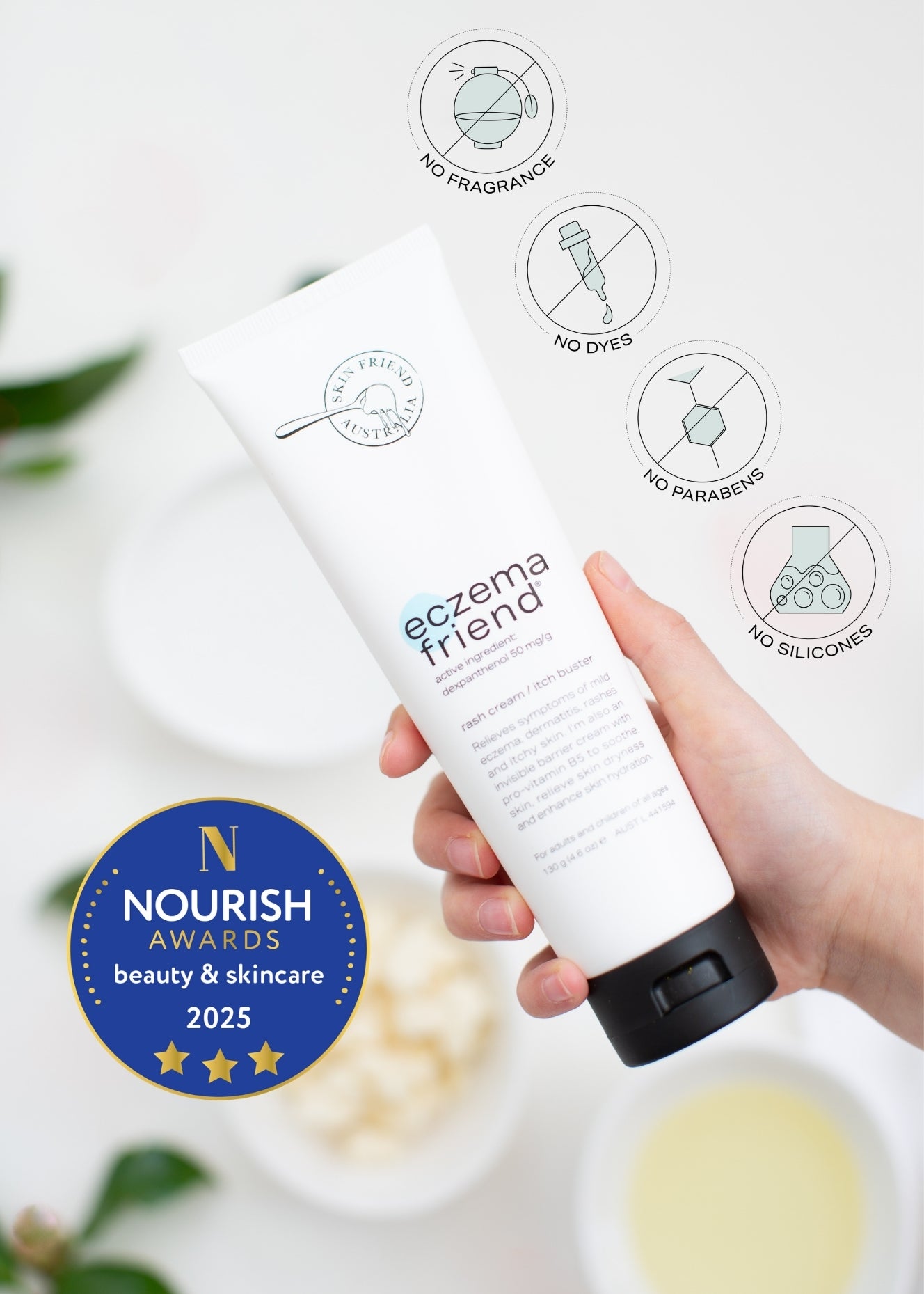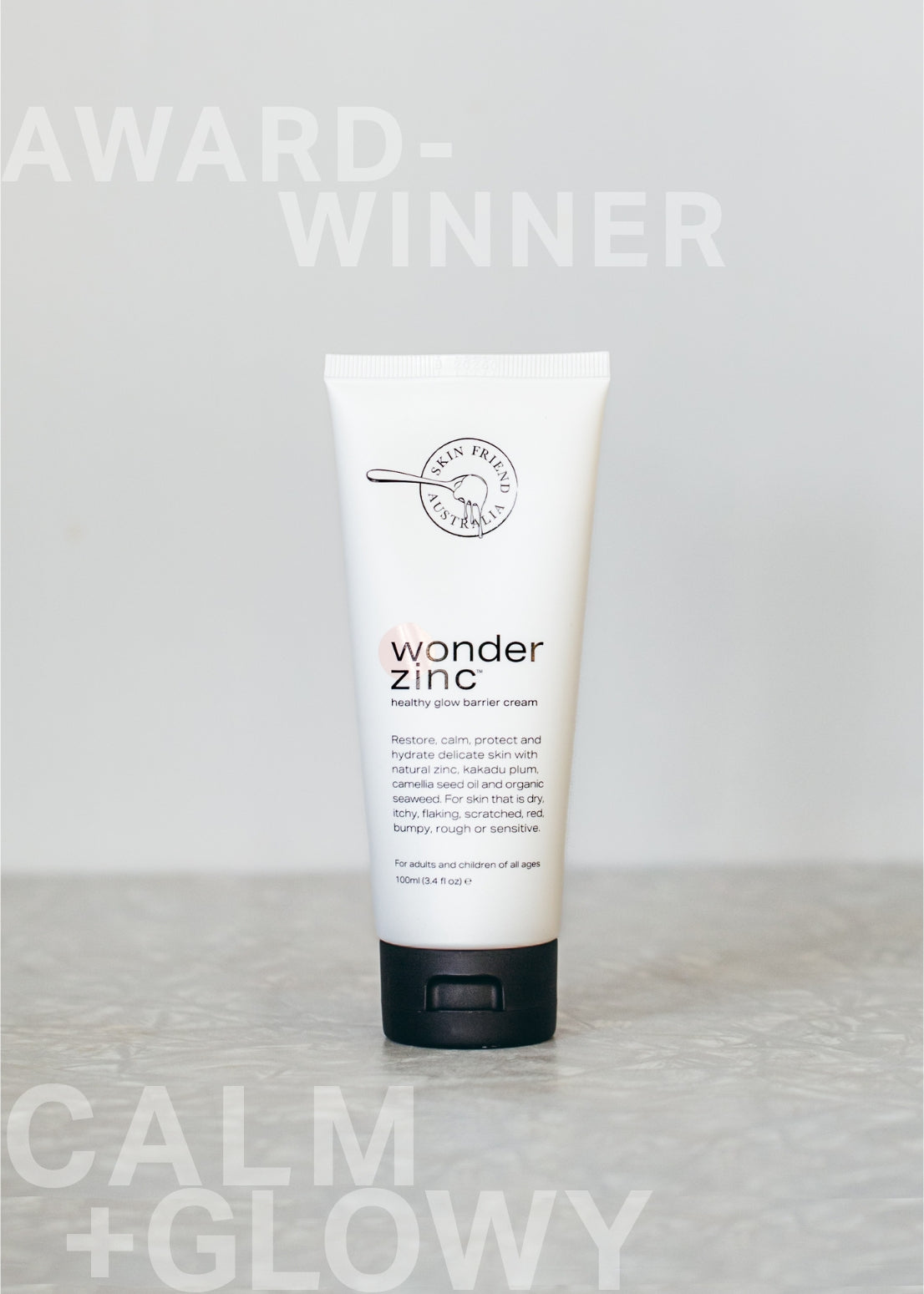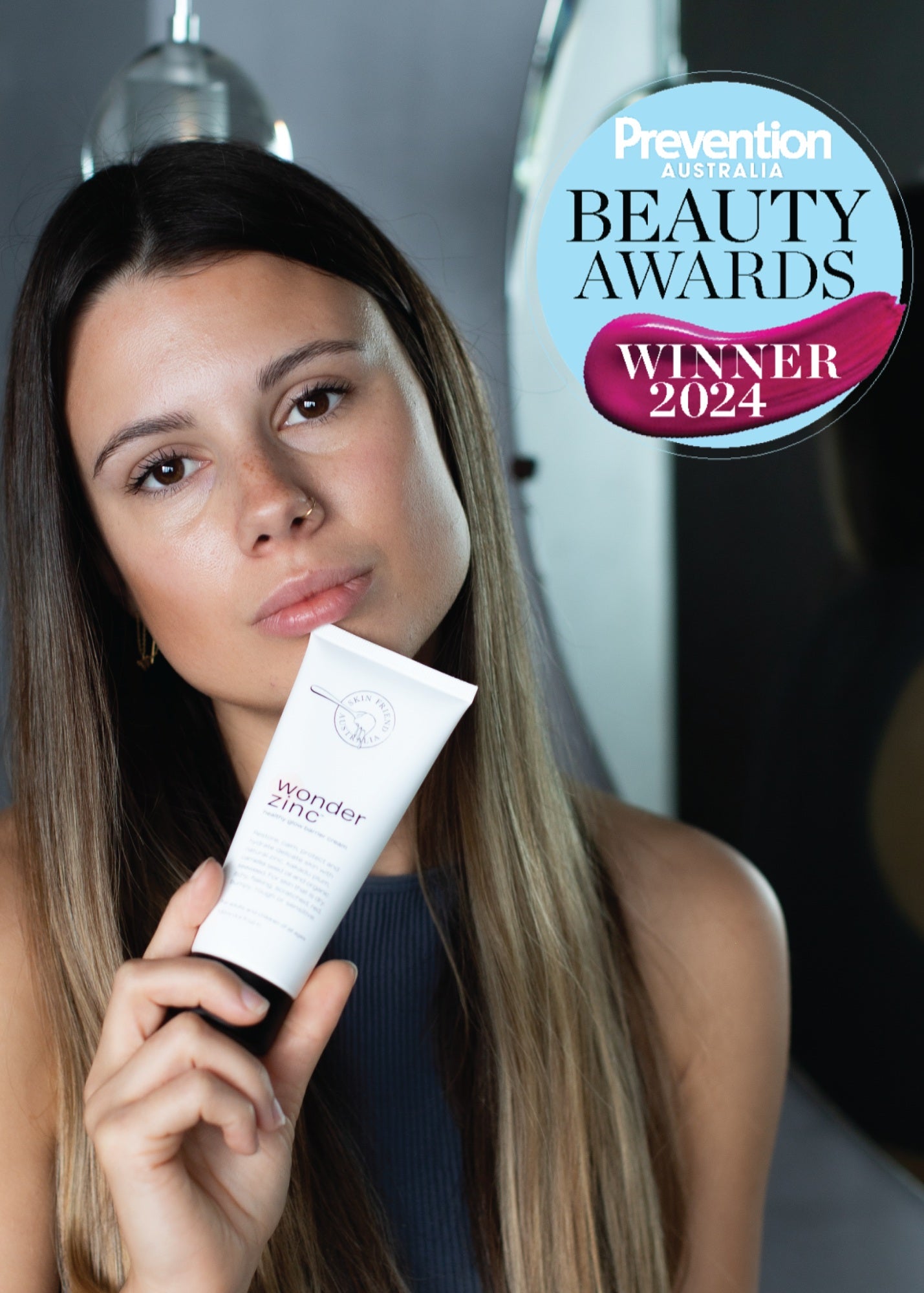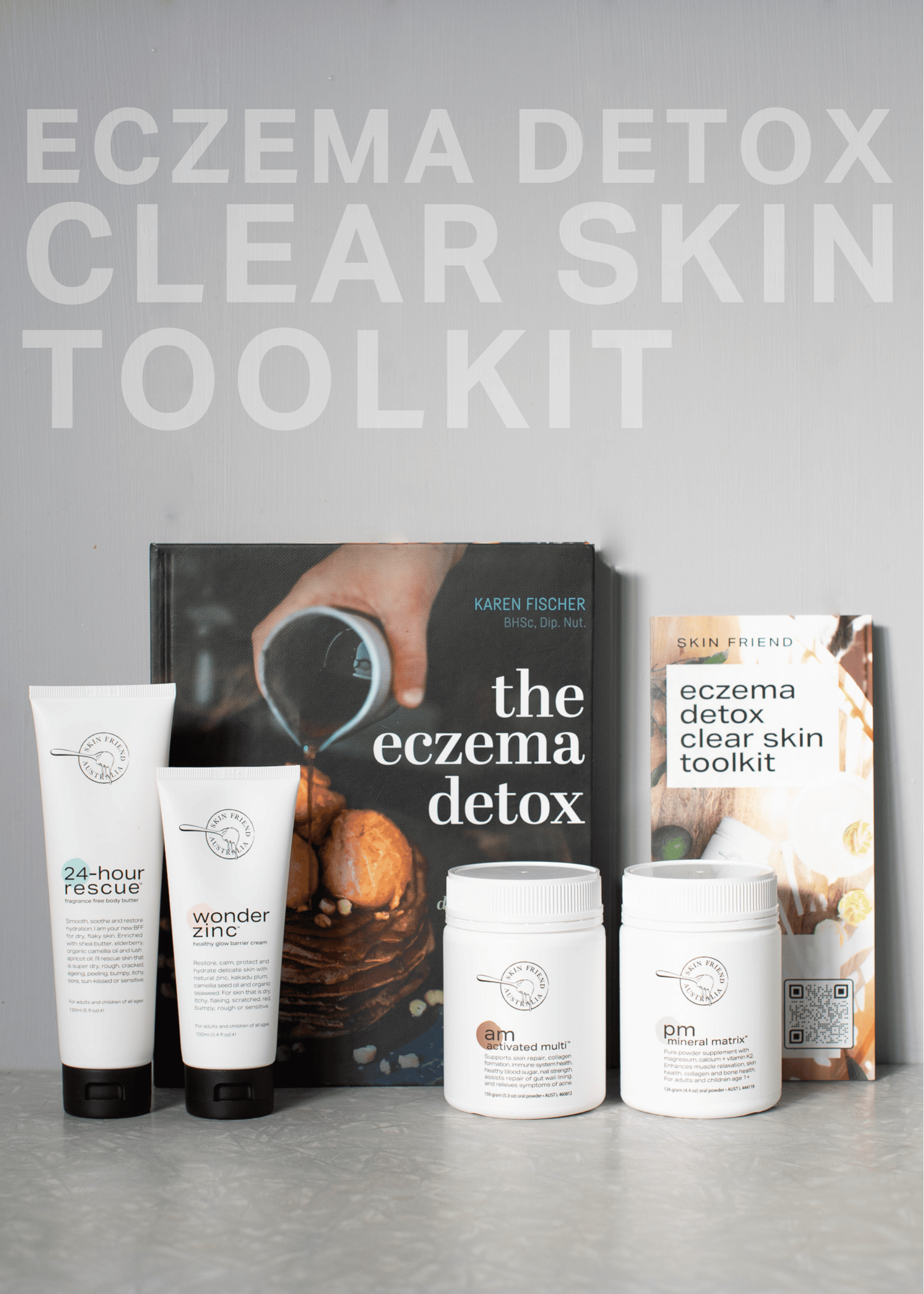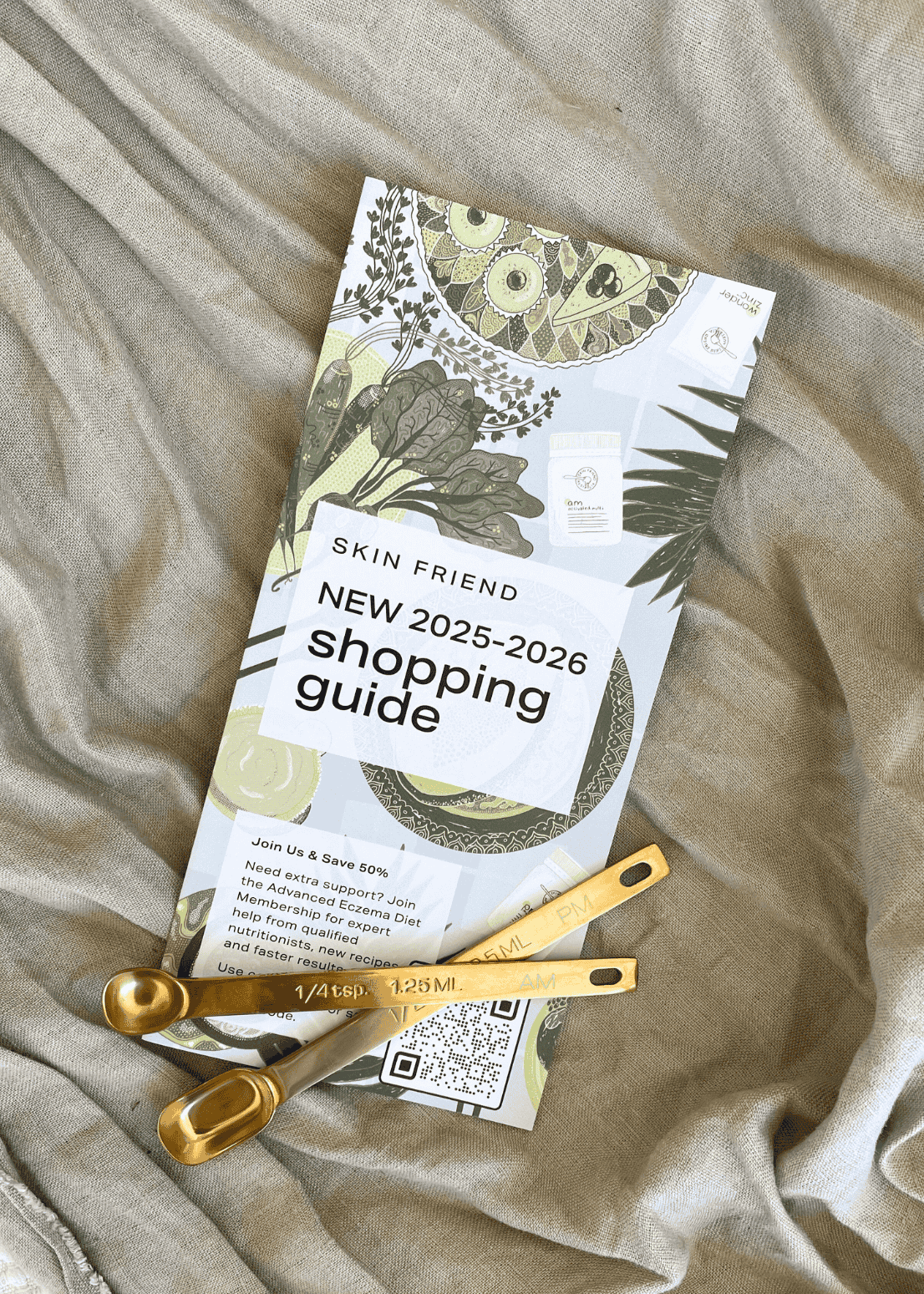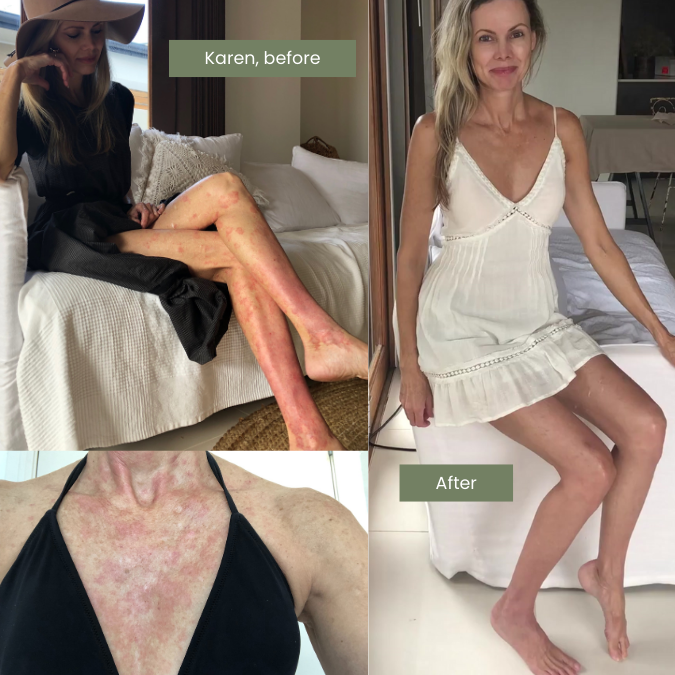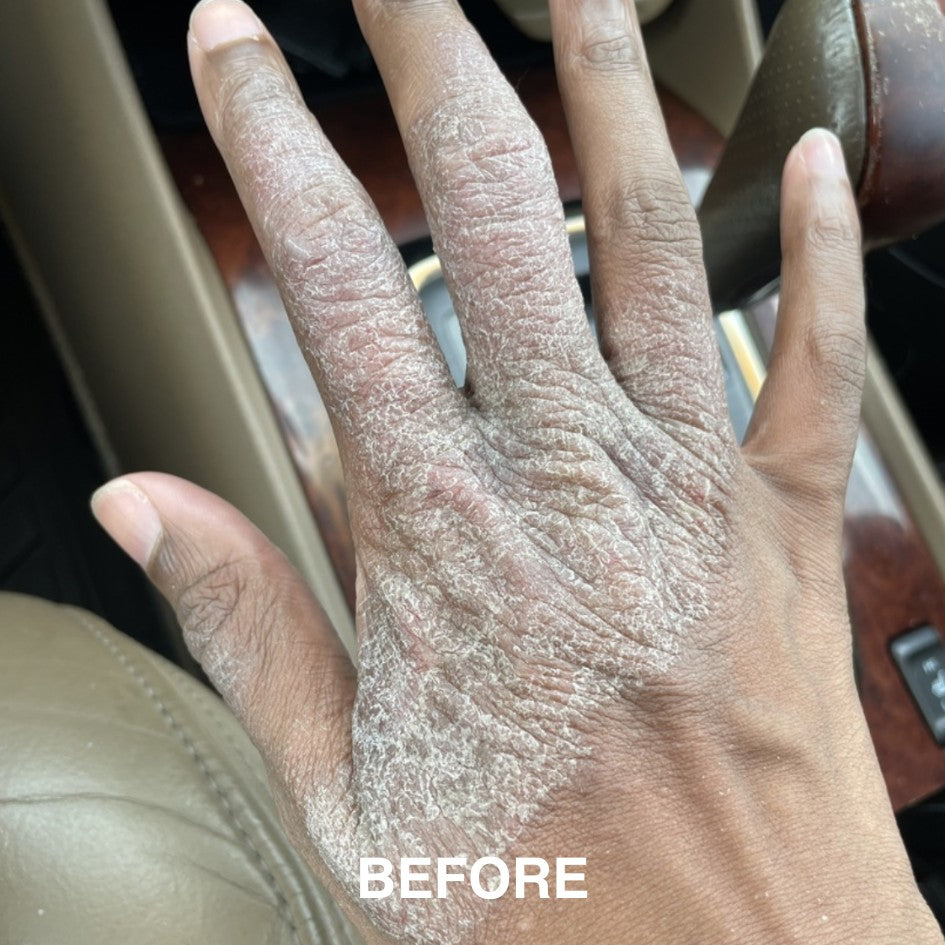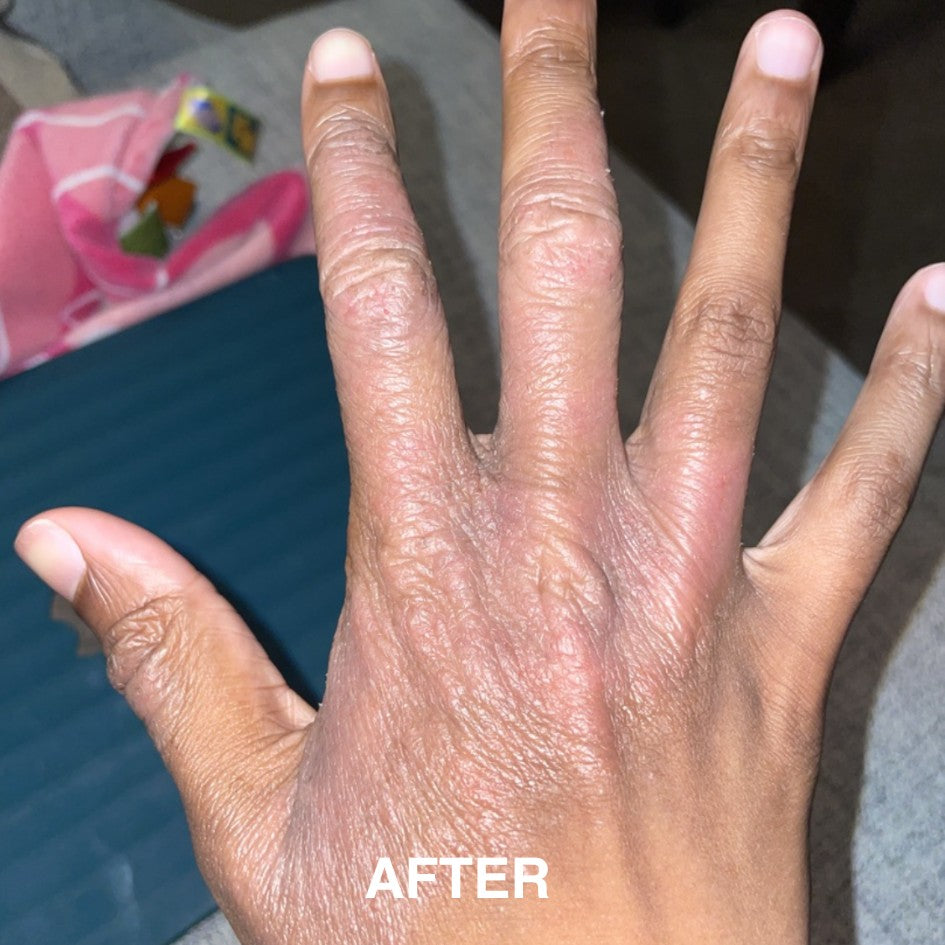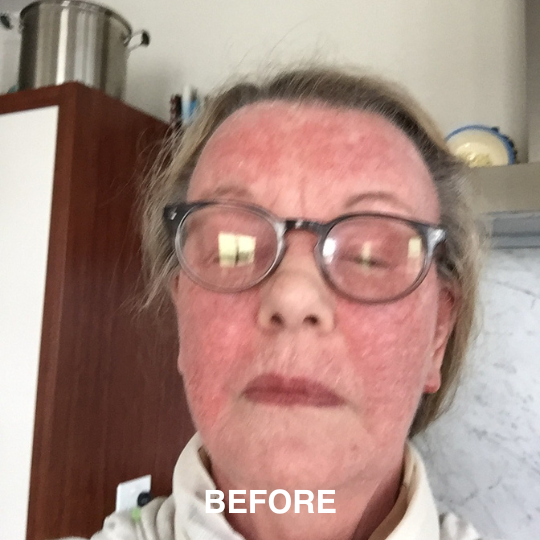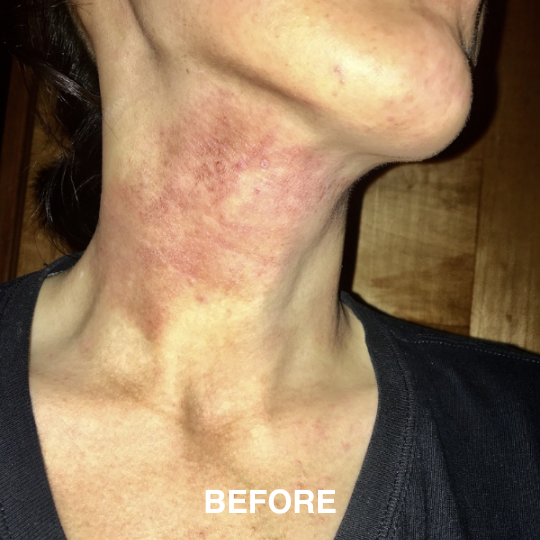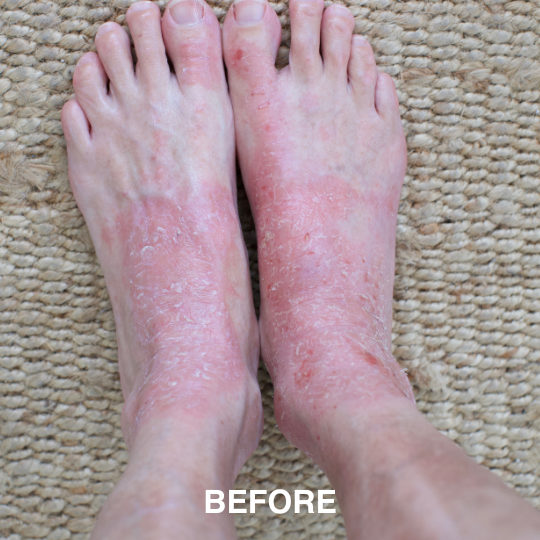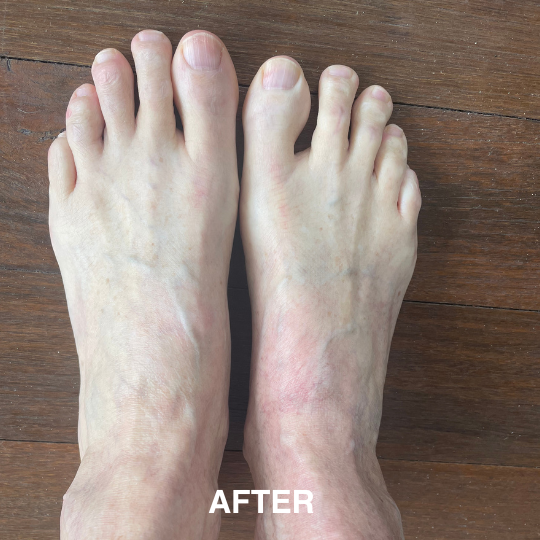Your skin: the body's diva. Treat it right, and life is smooth. Treat it wrong, and cue the rashes, redness, and endless itching.
I went down the rabbit hole of skincare science to uncover which oils are actually good for sensitive skin—and which ones are undercover troublemakers. Read up before your skin stages a protest (like my horrendous before pics at the end of this blog).

— Research-based blog by nutritionist Karen Fischer, BHSc.
Itchy 3 Worst Oils for Eczema
Let’s jump into the no-nos of eczema care ...
1. Are Essential Oils Safe for Eczema?
Using essential oils for scalp or body eczema might sound appealing, but it’s a slippery slope. While some essential oils have anti-inflammatory properties, they can often irritate sensitive skin, especially during an active flare-up, and they should not be used on babies or children with eczema. So what oils worsen eczema?
Essential oils can worsen eczema and they should not be used on babies, children and pregnant women because they can have adverse effects. Here are some examples:
-
Is Rosemary Oil Good for Eczema?: While rosemary oil is praised for its antimicrobial benefits, it’s not ideal for eczema. Its potent compounds can aggravate already-sensitive skin, leading to redness and irritation, according to research.
Image: Rosemary oil
-
Is Peppermint Oil Good for Eczema?: Peppermint oil’s cooling sensation might sound soothing, but it can trigger irritation and even allergic reactions in eczema-prone skin according to research, possibly because it is a rich source of itch-promoting salicylates.
Peppermint oil can cause tingling and burning sensations on the skin so it is not recommended for use on children or broken skin such as eczema.
-
Is Tea Tree Oil Good for Eczema?: Tea tree oil is known for its antiseptic and anti-inflammatory actions so people presume it is good for eczema. However, tea tree oil is a common skin irritant that can make eczema burn and sting when applied to the skin.
It’s best to avoid essential oils and stick to eczema skincare and supplements without additives — unless recommended by a dermatologist or blended into a product specifically designed for sensitive skin and eczema.

Image: Coconut oil
2. Why Coconut and Nut Oils May Worsen Eczema
Coconut oil and nut-based oils are often marketed as natural remedies for dry skin, but they can do more harm than good for those with eczema.
Coconut Oil: A Common Culprit
According to Allergy and Anaphylaxis Australia, topically applying coconut oil on your skin can increase the risk of developing coconut allergy. This is particularly concerning for allergy-prone children or people with eczema, whose compromised skin barrier makes them more susceptible to skin sensitisation and allergies.
Nut Oils and Sensitisation Risks
Similarly, nut oils (like almond oil, which is common in eczema creams) can introduce allergens to broken skin, potentially leading to food allergies. The link between food-based skincare products and the development of allergies is well-documented, especially in children, so it’s wise to avoid nut oils altogether if you’re managing eczema.

Image: Almond oil is a nut oil that should not be applied to eczema
3. The Problem with Olive Oil (Olea Europaea)
Olive oil is another popular skincare ingredient that can spell trouble for eczema-prone skin. Research involving children shows that olive oil weakens the skin barrier, causing irritation and increased water loss. Unfortunately olive oil is an ingredient used in about 80% of skin care products, so check the label before purchasing skin care products.
- Avoid any skin cream containing olive oil (also known as Olea Europaea)

Image: Instead of soothing your skin, olive oil can exacerbate dryness and leave your skin more vulnerable to environmental irritants. Use it for cooking and consuming instead.
Oils to Avoid for Scalp Eczema
Scalp eczema presents its own challenges, and oils that work well for other parts of the body can sometimes worsen symptoms on the scalp.
-
Essential Oils for Scalp Eczema: While they might smell great, essential oils like lemon balm and lavender can irritate the sensitive skin on your scalp.
-
Coconut oil and nut oils can cause scalp sensitisation so they should be avoided in allergy prone people.
-
For children with cradle cap, use safe oils on their scalp (see next).
Instead, look for lightweight, non-comedogenic products that contain dexpanthenol and castor oil, designed to soothe your scalp without clogging pores.
What to Use Instead: Eczema-Friendly Skincare
Managing eczema doesn’t mean giving up on oils entirely — it’s about choosing the right ones. Focus on products formulated specifically for sensitive skin and eczema.
Top 3 Best Oils for Eczema
1. The Barrier-Safe Oil: Sunflower Oil
Sunflower oil might not be trending (yet) but it's scientifically proven to be safe, hydrating and soothing on eczema skin, according to research by Danby et al (2013).
Image: Sunflower oil is a skin-safe oil that has been tested for safety and effectiveness on real people with eczema
2. Camellia oleifera seed oil
Traditionally used to treat burns and eczema, new research shows camellia seed oil is hydrating and anti-inflammatory (Zhou, 2024). It's also a rich source of antioxidants, squalene and omega-3, making it a great choice for rash-prone skin, and all ages including babies.
Image: Camellia seed oil is the beauty secret of the Japanese Geishas.
3. Castor Oil
Castor oil is a soothing, thick oil that often features in baby balms so it's gentle on all skin types and ages. After long-term use of topical steroids on your skin, hyperpigmentation (discolouration) of skin can occur, but castor oil can help to reduce hyperpigmentation, making it a top choice for eczema warriors.
Castor oil and camellia seed oil are both found in our Eczema Friend product.
FAQ: Should I apply pure oils to my eczema?
While you could apply pure organic sunflower oil to your baby's cradle cap (and gently comb it out), pure oils should not be applied on your eczema.
While these oils are beneficial for skin health, pure oils do not penetrate deeply (think ho-hum benefit) and they will make your skin greasy and "thirsty". This is because pure oils do not mimic your skin's layers so they cannot penetrate.
What's worse, some people recommend showering first and then leaving your skin a bit damp before applying oils in the false belief that this will be more hydration. But it's not true, because oil and water repel each other so they don't have the synergistic effect needed to improve skin health.
This is not ideal.
Why Pure Oils Aren’t the Holy Grail of Hydration
- Using pure oils here and there? Totally fine. But as a long-term skincare routine? That’s a skincare trap!
- They might feel nourishing at first, but pure oils are greasy, stain everything, and don’t provide lasting hydration—so you end up applying them over and over again.
- Plus, too much of a good thing can backfire! Frequent use can lead to skin sensitisation, increasing the risk of developing allergies to the oils you use.
Keep Your Skin Happy – Why Pure Oils Aren’t Enough
The truth is, no ingredient works alone.
You need a skincare combo that mimics your skin, so your skin can use it. By combining eczema-safe oils, water and a special type of emulsifier, this mimics your skin’s natural layer, so you get real hydration and relief.
It’s science meets skincare in the best way possible. This is called a "liquid crystal delivery system" where oils don’t just coat your skin like regular oils—instead, they penetrate deeply, providing lasting relief. No more greasy, ineffective creams—this combination helps your skin actually use the nourishing oils it needs. With consistent use, say goodbye to dryness and hello to hydrated, resilient skin.
How it works:
The crystal-forming emulsifier, when used in an increased amount, forms liquid crystal-like layers. To get the crystal-like effect, you need to use slightly more emulsifier than needed, and most brands don't know this. The crystal layers trap water and oil between them (see image, below). The layers then release water and oil as needed and less evaporation occurs, so your skin is soothed and protected for longer. This superior delivery system helps to soothe and hydrate eczema, better than plain oils can.
We used this liquid crystal delivery system in Eczema Friend.

Image: Oil in water cream stabilised in liquid crystal emulsifier (image created by Ayva, based on this ref)
With consistent use, your skin barrier gets naturally stronger so your skin is softer and calmer and less reliant on moisturisers. So your skin is less "drama queen" and more strong and dependable.
Soothing Your Skin Naturally
First, I need to address something that has been bothering me:
I have worked with eczema patients for more than 20 years and I could not find effective and safe products for my eczema patients. Most companies rush the product-creation process to be "first to market"—this means most eczema creams, trend-based skincare products and supplements are poorly designed with virtually no testing.
You (the consumer) are the guinea pigs.
Plus, most trendy brands use unsafe ingredients like olive oil which damages the skin barrier or ingredients that increase your risk of developing food allergy such as goat's milk, almond oil, tallow or coconut oil.
No one does their research. It's insane.
So more than 15 years ago I started designing products for my family and patients, which became the Skin Friend range. Each product takes at least two years of research and testing, which is rare.
I admit, we are often LAST to market ... but at least the products work!
Take our new eczema cream for example. Eczema Friend is based on new science, it contains safe oils and that crystal layer emulsifier I was banging on about a moment ago. Plus it took years of research and testing to create. We tested it on real people with all types of eczema and got their honest feedback so we knew the product worked before we sold it online. Click here to learn more

Oils Aint Oils
If you want to treat your eczema naturally, the oils you use or avoid can make all the difference. Steer clear of coconut, almond, olive, and some essential oils, because they may make your skin worse, and favour creams formulated with proven oils like camellia, castor and sunflower oil for eczema-prone skin.
Scroll down to Shop The Story and see before and after pics.
Research
Click for references
Allergy and Anaphylaxis Australia, 2024, Development of food allergy through food-based skincare products, retrieved 12 January 2024, from https://allergyfacts.org.au/development-of-food-allergy-through-food-based-skincare-products/
Swain AR, et al. (1985). Salicylates in Foods. J Am Diet Assoc. Retrieved from https://www.slhd.nsw.gov.au/rpa/allergy/research/salicylatesinfoods.pdf
Danby SG, et al. (2013). Effect of olive and sunflower seed oil on the adult skin barrier: implications for neonatal skin care. Pediatr Dermatol. 30(1):42–50. DOI. PMID: 22995032.
Carson CF, et al. (2006). Melaleuca alternifolia (Tea Tree) oil: a review of antimicrobial and other medicinal properties. Clin Microbiol Rev. 19(1):50–62. DOI. PMID: 16418522; PMCID: PMC1360273.
van der Valk PG, et al. (1994). Allergic contact eczema due to 'tea tree' oil. Ned Tijdschr Geneeskd. 138(16):823–825. PMID: 8183387.
Tran A, et al. (2010). Acute allergic contact dermatitis of the lips from peppermint oil in a lip balm. Dermatitis. 21(2):111–115. PMID: 20233551.
Zhou L, et al. (2024). The Antioxidant, Anti-Inflammatory and Moisturizing Effects of Camellia oleifera Oil. Molecules. 29(8):1864. DOI. PMID: 38675684; PMCID: PMC11055129.
Parvizi MM, et al. (2024). Efficacy of castor oil cream in treating infraorbital hyperpigmentation. J Cosmet Dermatol. 23(3):911–917. DOI. PMID: 37927123.












